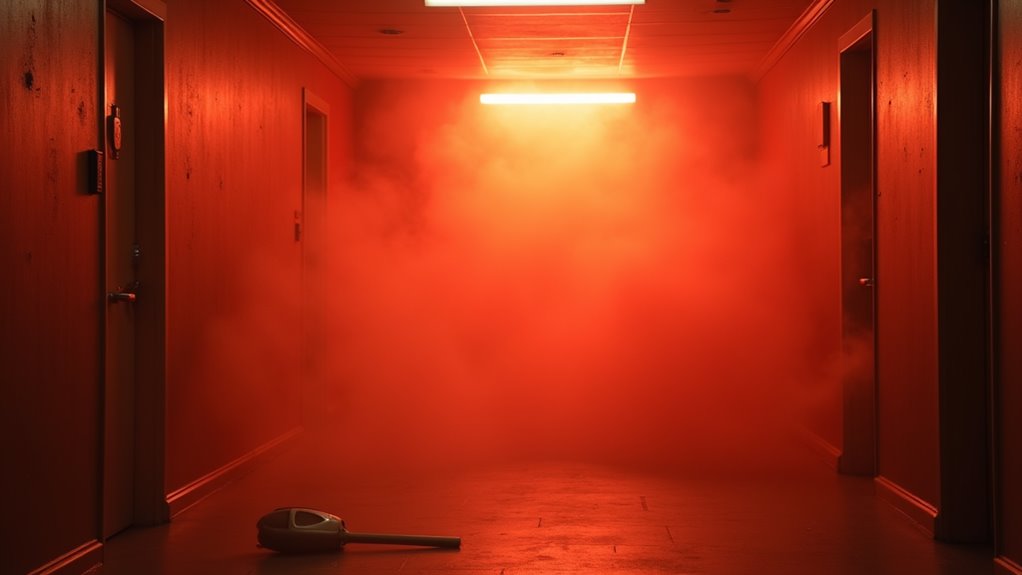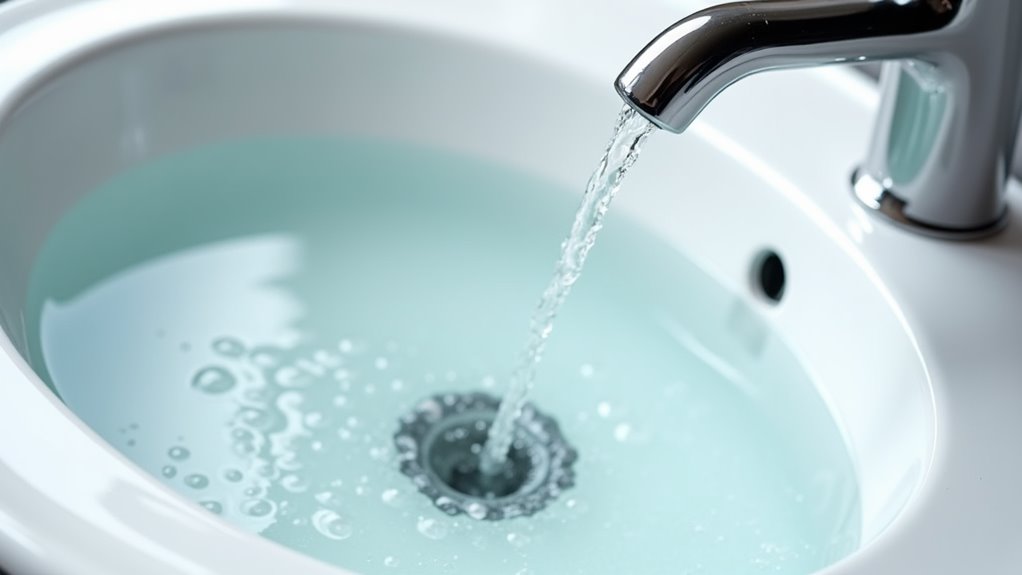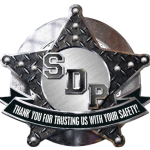When you’re exposed to pepper spray, you’ll experience immediate and intense burning in your eyes, violent coughing, and difficulty breathing normally. Your eyes will forcefully shut as tears stream down your face, while throat irritation causes painful gagging. You’ll likely stumble and lose balance due to disorientation. These incapacitating effects typically last 30-45 minutes, but proper first aid techniques can help reduce your suffering and speed up recovery.
Immediate Incapacitation of Threats

When you’re hit with pepper spray, you’ll immediately experience an intense burning sensation in your eyes that’ll make it nearly impossible to keep them open, forcing them to slam shut. Your body will react with violent coughing and gagging as the spray irritates your throat and airways, making it difficult to breathe normally or speak clearly. The combination of these effects, along with the disorienting burn in your nose and throat, can cause you to lose your balance and stumble, making it hard to remain standing or move in a coordinated way. The effects can last up to 45 minutes, providing the user ample time to escape or seek help. The WildFire 1.4% Crowd Control Pepper Spray is specifically designed to deter multiple attackers, making it a preferred choice for law enforcement and security personnel.
Intense Burning Eye Sensation
Once pepper spray makes contact with your eyes, you’ll experience an immediate and overwhelming burning sensation that can instantly stop an attacker in their tracks. You’ll feel like your eyes are on fire, and you won’t be able to keep them open as tears stream down your face. Understanding proper eye irritation management and safety precautions is essential if you’re ever exposed.
| Symptom | Duration | Relief Method |
|---|---|---|
| Burning | 30-45 mins | Cold water rinse |
| Tearing | 20-30 mins | Fresh air exposure |
| Swelling | 1-2 hours | Cool compress |
When your eyes are affected, don’t rub them – this’ll only make the burning worse. Instead, blink repeatedly to help flush out the irritant naturally, and if possible, find clean water to rinse your eyes immediately.
Uncontrollable Coughing and Gagging
A powerful blast of pepper spray to your respiratory system triggers an immediate and violent coughing reflex that’ll leave you gasping for air, making it nearly impossible to continue any aggressive behavior.
Your body’s natural coughing reflex kicks into overdrive as the pepper spray irritates your throat and airways, causing you to hack and wheeze uncontrollably.
The gagging response follows quickly, and you’ll feel like you can’t catch your breath as your body tries to expel the irritating substance.
Your chest tightens, your throat constricts, and breathing becomes difficult and painful.
These effects aren’t just uncomfortable – they’re specifically designed to stop an attacker in their tracks.
Even if you’re in good physical shape, you won’t be able to fight through these intense respiratory reactions.
Temporary Loss of Balance
Beyond the respiratory distress you’ll experience, pepper spray’s powerful effects extend to your body’s sense of balance and coordination.
You’ll likely feel disoriented and unstable on your feet, making it difficult to walk or run normally.
When pepper spray affects your balance, you might notice these symptoms:
- Dizziness that makes the room seem like it’s spinning
- Stumbling or staggering when trying to move
- Difficulty maintaining your normal posture
- Problems with depth perception and spatial awareness
- Feeling like you’re going to fall over
While these effects are temporary, knowing basic balance recovery techniques can help you regain stability faster.
Simple physical coordination exercises, like focusing on a fixed point or keeping your feet shoulder-width apart, can help you maintain your composure until the effects wear off.
Avoid Rubbing Your Eyes
When pepper spray gets in your eyes, you’ll feel an overwhelming urge to rub them, but doing so will make the pain and irritation considerably worse. As part of proper first aid, you need to resist touching your eyes at all costs, since rubbing will only grind the pepper spray particles deeper into your eye tissue and prolong your discomfort. Instead of rubbing, you should focus on proper eye care by blinking repeatedly to help flush out the irritants naturally with your tears. If you’re wearing contact lenses, you’ll need to remove them carefully with clean hands as soon as possible, since the lenses can trap pepper spray against your eyes. Remember that even though your eyes are burning intensely, touching or rubbing them will only extend your recovery time and could potentially cause damage to your corneas. The Mace Pocket Model Triple Action spray includes OC Pepper, which can cause your eyes to shut and induce coughing, making it essential to manage exposure carefully.
Flush Eyes With Water Thoroughly

The most effective way to treat pepper spray exposure is immediate and thorough eye flushing with clean, cool water for at least 15 minutes straight.
You’ll need to use proper eye irrigation techniques, which involve tilting your head to the side and letting the water run from the inner corner of your eye to the outer corner, ensuring the contaminated water doesn’t spread to other areas of your face.
The water temperature effects are important – you don’t want to use hot water as it can make the burning sensation worse, but you also shouldn’t use ice-cold water as it might shock your system.
If you’re wearing contact lenses, you’ll need to remove them first, though it’s likely they’ll be ruined and you’ll need to replace them afterward.
Look for Respiratory Distress
Monitoring signs of respiratory distress becomes critically important after exposure to pepper spray, as breathing difficulties can escalate quickly and potentially become dangerous.
If you’re noticing symptoms like wheezing, coughing, or a tight feeling in your chest, you’ll need to react fast to minimize respiratory irritation and keep yourself safe.
Watch out for signs that your breathing’s getting worse – if you can’t catch your breath, feel dizzy, or notice your lips turning bluish, you should seek medical help right away.
Remember, exposure symptoms can vary from person to person, so even if you’re experiencing mild discomfort, it’s better to be cautious.
Move to fresh air immediately, try to stay calm, and take slow, measured breaths while keeping your airways as relaxed as possible.
Answers to Common Questions
How Long Does Pepper Spray Stay Active on Skin and Clothes?
Did you know 90% of people experience ongoing effects? You’ll feel skin irritation for up to 45 minutes, while clothing contamination can last several days unless you wash items in cold water immediately.
Can Pepper Spray Cause Permanent Eye Damage or Blindness?
While permanent vision loss from pepper spray is extremely rare, you’ll need to protect your eye safety by seeking immediate medical attention if exposed. Most symptoms resolve completely within 24-48 hours without lasting damage.
Does Milk Really Help Neutralize the Effects of Pepper Spray?
Like a knight’s shield crumbling in battle, milk’s effectiveness against pepper spray is largely a myth. You’re better off using cool water or saline solution – proven pepper spray alternatives that actually work.
What Is the Legal Age to Purchase and Carry Pepper Spray?
You’ll find legal restrictions on pepper spray vary by state. While most states allow purchase at age 18, some require you to be 21. Check your local age requirements and restrictions before buying or carrying.
How Far Can Pepper Spray Reach When Sprayed From the Canister?
You’ll find that most pepper sprays have an effective range of 8-12 feet. The spray distance can vary depending on the canister size and model, but you shouldn’t rely on it beyond 10 feet.
Bottom Line
When you’ve had an unfortunate encounter with defensive spray, you’ll want to act quickly to minimize its effects. Remember to keep your hands away from your face, find clean water to thoroughly rinse your eyes and skin, and make sure you’re breathing normally. While these protective sprays can certainly ruin your day, knowing how to handle exposure will help you bounce back more comfortably and get back to normal faster.




